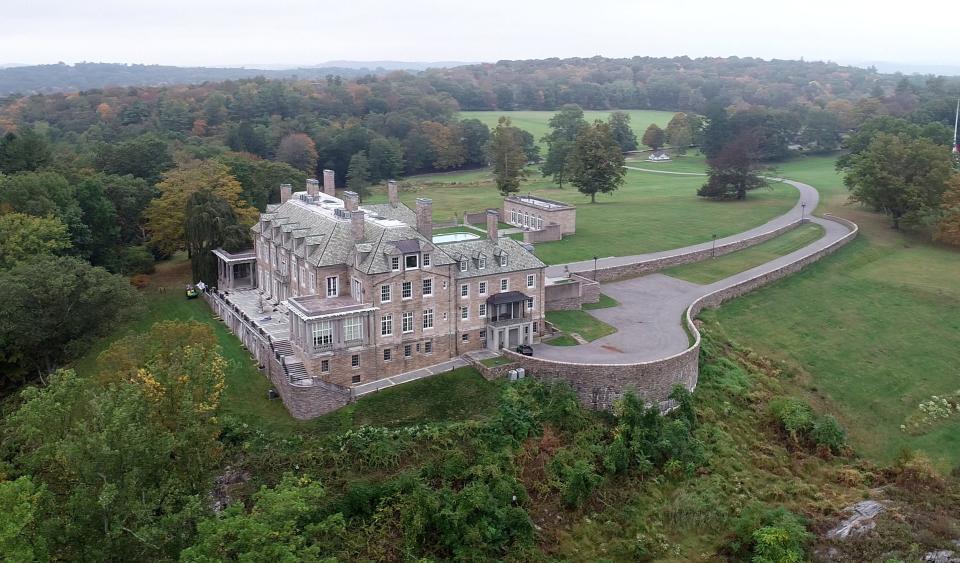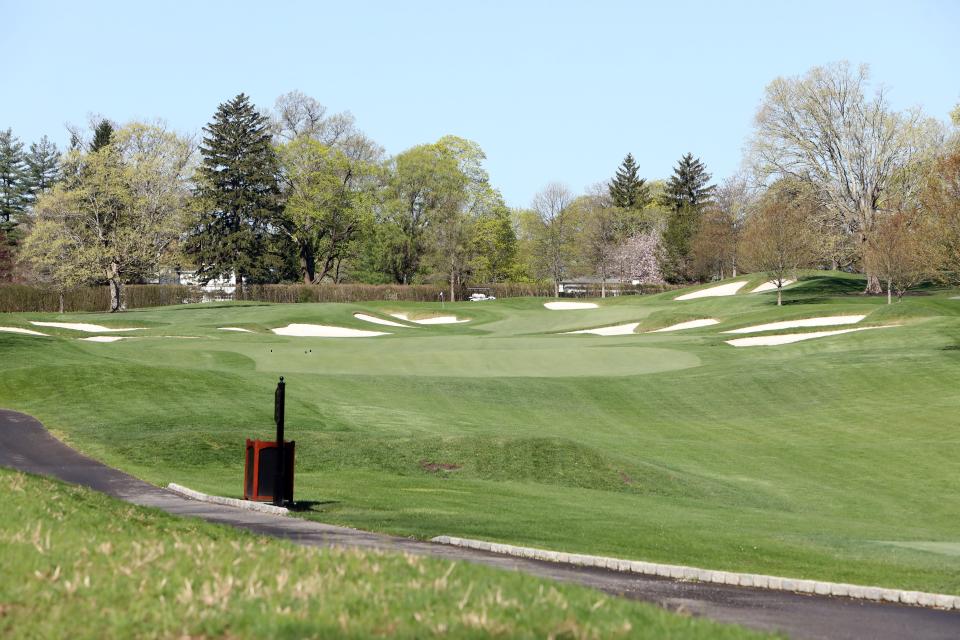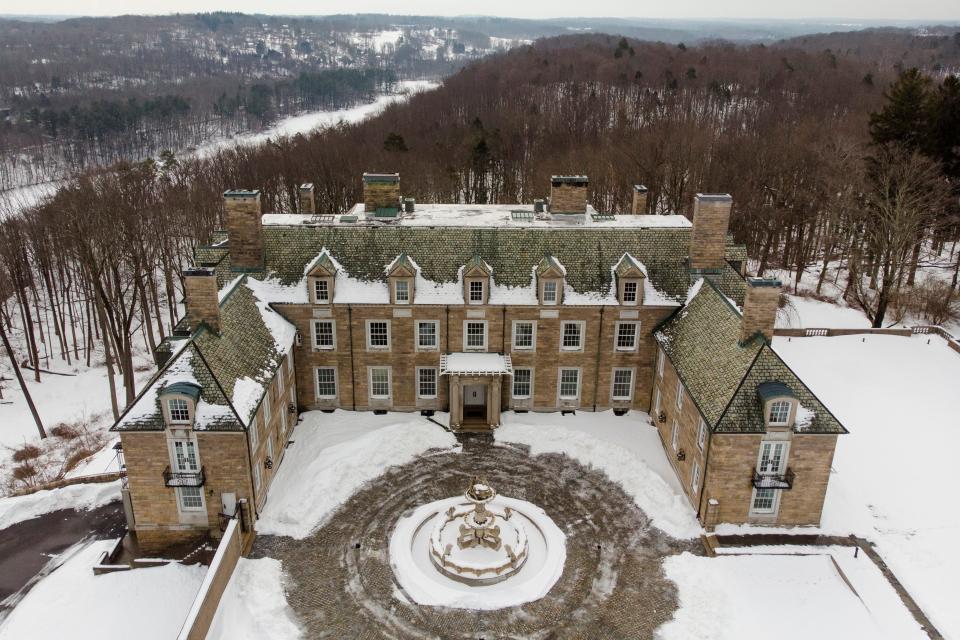AG James finds Trump's valuations suspect at Trump National and Seven Springs in Westchester
- Oops!Something went wrong.Please try again later.
- Oops!Something went wrong.Please try again later.
- Oops!Something went wrong.Please try again later.
Donald Trump’s alleged penchant for inflating the value of his Westchester properties in financial statements have become a centerpiece of New York Attorney General Letitia James’ investigation into the Trump Organization.
In an explosive court filing on Tuesday, James revealed tactics used by the company to boost the reported value of Trump National Golf Club in Briarcliff Manor and at his Seven Springs estate in the towns of New Castle, North Castle and Bedford.
The puffed-up values alleged by James were also involved in his donation of a conservation easement on 159 acres at Seven Springs, which brought Trump significant tax savings on his personal income taxes.

"He may have met his match in Tish James,” said Larchmont resident Shannon Powell, of Indivisible Westchester.
Briarcliff: Trump wins property assessment case in Briarcliff and Ossining at golf club
James: NY AG opens criminal investigation of Trump
Trump: Seeks 90% tax reduction at Briarcliff golf course
These values were recorded for banks and insurance companies, just as another arm of the Trump Organization was fighting to slash the value of Trump National in what turned out to be the company’s successful bid to lower the club’s taxable value on the Ossining assessments rolls.
The court documents contain the attorney general’s most detailed accounting yet of a long-running investigation into allegations that Trump’s company exaggerated the value of its holdings to impress lenders or misstated what land was worth to slash its tax burden, according to a report by the Associated Press Wednesday.
The Trump Organization, James’ office said, overstated the value of land donations made in New York and California on paperwork submitted to the IRS to justify several million dollars in tax deductions. The Trump Organization issued a statement Wednesday calling the investigation “baseless” and politically motivated, AP reported.
James’ filing came in a petition aimed to secure the testimony of Trump, his son, Donald Trump, Jr., and his daughter, Ivanka. His younger son, Eric, last year invoked his Fifth Amendment rights against self-incrimination 500 times during his interview with James’ investigators in the civil probe.
The filing said Eric Trump was the company official who often communicated by phone with accountants at Mazars USA, who drew up the financial statements.

Trump National
The filing provided details on the inner workings of Trump National, the private club that opened in 2002 and was apparently having trouble finding members willing to pay initiation fees of $150,000 by the early 2010s.
James’ investigators found that financial incentives used to attract new members were not reflected in the Trump Organization’s financial statements. The value of the initiation fees on unsold memberships were included in those statements at a time when new members didn't pay them, according to the attorney general's office.
The phone was not answered Wednesday at the Trump Organization when Tax Watch called several times seeking comment.
In 2011, Trump National valued the property at $69 million, based in part on the value of 67 unsold memberships, whose value the company pegged at $13 million.
While some Trump documents noted initiation fees of $150,000, the value of some of the unsold memberships were much higher, with some valued at as much as $250,000, according to documents obtained by James.
Then came the discovery that the Trump Organization’s representation that it cost $150,000 to obtain a membership in 2011 were misleading as well.
“Records indicate that many members paid no deposit for their memberships,” court papers said.
The next year, membership records showed that no new members paid the initiation fee. Yet the company’s 2012 valuation put the club’s value at $100 million, based in part on the unsold memberships.
The legal filing revealed the lucrative side of Trump real estate endeavors, if everything went according to plan. The 2012 values reflected the estimated profit of $25 million for 31 townhouses. Yet construction of those units not begun.
By 2013, the club’s value has risen once more, to $176 million, based on the projected profit of $102 million on the sales of 71 townhouses that were approved for construction, but still not built.
“A reader of the statement would also be unaware that this increase in value came in part from adding 40 homes and over $75 million in additional profit to the forecast of a project that was on hold,” the filing said.

Seven Springs
James’ investigation at Seven Springs involves the valuation of seven mansions that received approval in the town of Bedford, as well as the development potential at the site as Trump prepared to donate a conservation easement on 159 acres.
Seven Springs, the one-time home of Washington Post publisher Eugene Mayer, includes a 60-room mansion on a bluff overlooking the Byram Reservoir.
Trump bought the estate for a bargain in 1995 for $7.5 million. By 2000, Trump’s appraiser valued it at $25 million, with that value rising to $30 million by 2006.
Trump had first proposed a golf course there, but that plan failed because Trump could not overcome community resistance to the environmental impact of run-off from the course into the drinking water supply. A second plan for 17 mansions also never materialized following a legal slugfest over access to the site in North Castle.
Trump retreated to Bedford, winning approval for seven mansions, but Trump transferred the conservation easement before finalizing the approvals.
Nevertheless, the Trump Organization valued Seven Springs at $291 million from 2012 to 2014, which included the value of the homes that were never built.
The value of the conservation easement had an impact on Donald Trump's personal finances, according to the court filing, with deductions for the easement donation appearing on Trump federal income tax filings for many years. James found that the tax benefit at Seven Springs and Trump National Golf Club LA were worth more than $5 million to Trump from 2014 to 2018.
James’ investigation found numerous discrepancies in the financial statements regarding Seven Springs, according to the filing.
The company’s 2013 and 2014 financial statements included rosy projections of profits of the seven Bedford mansions that had yet to be built. Each one would sell for the sky-high price of $35 million, with each house bringing profits of $23 million. With seven homes winning local approval, the company added $161 million to the company’s value.
James was not impressed, following an interview with Trump Senior Vice President Jeffrey McConney.
“McConney testified that this valuation includes the full amount that would be generated from the sale of non-existent homes without taking into account the years it would take to construct infrastructure, build homes, obtain necessary approvals and sell the number of homes,” the filing stated.
When it came time in 2014 to value the land for the conservation easement, Trump’s appraisal firm, Cushman & Wakefield, considered the value of building 24 homes in New Castle, North Castle, and Bedford, even though Trump only had approvals for seven homes in Bedford.
The approval for the Bedford homes, meanwhile, had tight restrictions on building that were not reflected in the valuation. It stated that only five acres of the site could be disturbed at any one time, which would slow construction. It also set limits on access to Seven Springs lots in New Castle or North Castle, with only two homes allowed there on the road coming from Bedford.
The appraisers from Cushman said they were never shown the Bedford resolution that included these restrictions. Neither did the engineer from Insite Engineering who designed the 24-lot subdivision, for which there were no building sites approved in New Castle and North Castle.
“A single subdivision road serving 24 lots in Bedford, New Castle and New Castle, with only access through Bedford, would violate the restrictions imposed by Bedford that the Trump Organization negotiated and agreed to,” the filing said.
When the Insite engineer Scott Blakely learned there might be problems with the 24-lot subdivision, the filing said he had a phone conversation with Eric Trump.
Blakeley’s notes from the conservation stated: “Tel conv w Eric. ‘Move forward as laid out. We have our rights.’”
Follow Tax Watch columnist David McKay Wilson on Facebook or Twitter @davidmckaywils1. He has written about Hudson Valley public affairs since 1986. Check out his latest columns at lohud.com
This article originally appeared on Rockland/Westchester Journal News: Trump's Westchester holdings focus of NY attorney general investigation

